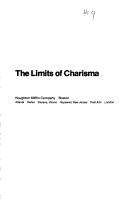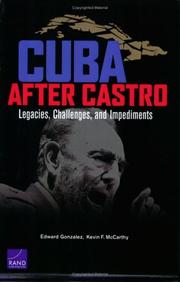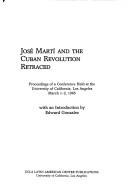| Listing 1 - 10 of 14 | << page >> |
Sort by
|

ISBN: 0395140676 9780395140673 Year: 1974 Publisher: Boston, Mass. Houghton Mifflin
Abstract | Keywords | Export | Availability | Bookmark
 Loading...
Loading...Choose an application
- Reference Manager
- EndNote
- RefWorks (Direct export to RefWorks)
Political systems --- Internal politics --- Cuba --- Castro, Fidel, --- History --- 328 <8=6> --- #SBIB:328H32 --- Parlement. Volksvertegenwoordiging. Regering en parlement--Latijns Amerika --- Instellingen en beleid: Midden en Latijns-Amerika --- Castro, Fidel --- -History --- -328 <8=6> --- 328 <8=6> Parlement. Volksvertegenwoordiging. Regering en parlement--Latijns Amerika --- -Political systems --- Küba --- Guba --- Kkuba --- Republic of Cuba --- República de Cuba --- キューバ --- Kyūba --- Kuuba --- -#SBIB:328H32 --- Kastro, Fidelʹ, --- Kastro Rus, Fidelʹ, --- Kāstrū, Fīdayl, --- Ruz, Fidel Castro, --- Castro Ruz, Fidel, --- Kaxtro, Fidel, --- Kastro, Phintel, --- Kāsṭrō, K̲apiṭal, --- קסטרו, פידל, --- 卡斯特罗菲德尔, --- كاسترو، فيدل، --- Castro, Fidel, - 1926-2016 --- Cuba - History - 1933-1959 --- Cuba - History - 1959-1990
Book
Year: 1984 Publisher: Santa Monica, CA : RAND Corporation,
Abstract | Keywords | Export | Availability | Bookmark
 Loading...
Loading...Choose an application
- Reference Manager
- EndNote
- RefWorks (Direct export to RefWorks)
This report looks at Central America in the light of U.S. foreign policy interests. It discusses the new policy environment of the 1980s, including changes and significance for U.S. policy. It describes U.S. interests in Central America by looking at strategic and security interests, moral and institutional values, and balancing interests and values. Security trends and potential threats are given by presentation of two scenarios: one of the MiGs and Cuban combat forces in Nicaragua and the other of a guerrilla victory in El Salvador. The challenge of Nicaragua is looked at in detail and deals with options for dealing with a Sandinista regime and options to prevent a Cuban-Soviet military buildup. Finally, general implications for U.S. policy are given, including basic guidelines for a long-term policy and political, economic, and military dimensions.
United States --- Central America --- Military policy. --- Military relations --- Foreign relations
Book
Year: 1974 Publisher: Boston-Atlanta-London Houghton Mifflin
Abstract | Keywords | Export | Availability | Bookmark
 Loading...
Loading...Choose an application
- Reference Manager
- EndNote
- RefWorks (Direct export to RefWorks)
Book
ISBN: 0833007394 Year: 1986 Publisher: Santa Monica Rand
Abstract | Keywords | Export | Availability | Bookmark
 Loading...
Loading...Choose an application
- Reference Manager
- EndNote
- RefWorks (Direct export to RefWorks)
Heads of state --- Castro, Fidel, --- Psychology. --- Cuba --- Cuba --- Foreign relations --- Politics and government

ISBN: 1282451332 9786612451331 0833036173 0833035355 9780833036179 9781282451339 9780833035356 6612451335 Year: 2004 Publisher: Santa Monica, Calif. RAND Corp.
Abstract | Keywords | Export | Availability | Bookmark
 Loading...
Loading...Choose an application
- Reference Manager
- EndNote
- RefWorks (Direct export to RefWorks)
When the end of the Castro era arrives, the successor government and the Cuban people will need to answer certain questions: How is Castro?s more than four-decade rule likely to affect a post-Castro Cuba? What will be the political, social, and economic challenges Cuba will confront? What are the impediments to Cuba?s economic development and democratic transition? The authors examine Castro?s political legacies, Cuba?s generational and racial divisions, its demographic predicament, the legacy of a centralized economy,and the need for industrial restructuring.
Cuba--Economic conditions--1990-. --- Cuba--Forecasting. --- Cuba--Politics and government--1959-. --- Cuba--Social conditions--1959-. --- Economic forecasting--Cuba. --- Social problems--Cuba--History--20th century. --- Social problems --- Economic forecasting --- Regions & Countries - Americas --- History & Archaeology --- Latin America --- History --- Cuba --- Politics and government --- Social conditions --- Economic conditions --- Forecasting. --- Problèmes sociaux --- Prévision économique --- Histoire --- Forecasting --- Politique et gouvernement --- Conditions sociales --- Conditions économiques --- Prévision --- Economics --- Reform, Social --- Social reform --- Social welfare --- Küba --- Guba --- Kkuba --- Republic of Cuba --- República de Cuba --- キューバ --- Kyūba --- Kuuba --- Economic indicators --- Social history --- Applied sociology

Abstract | Keywords | Export | Availability | Bookmark
 Loading...
Loading...Choose an application
- Reference Manager
- EndNote
- RefWorks (Direct export to RefWorks)
Book
Year: 1986 Publisher: Santa Monica, CA : RAND Corporation,
Abstract | Keywords | Export | Availability | Bookmark
 Loading...
Loading...Choose an application
- Reference Manager
- EndNote
- RefWorks (Direct export to RefWorks)
"This report presents the main findings of [Castro, Cuba, and the World], R-3420, which provides a new profile of Fidel Castro's mindset and behavior as a political actor, and assesses Cuba's current domestic and international situations, in order to analyze Castro's future foreign policy options."--Rand abstracts
Heads of state --- Castro, Fidel, --- Psychology. --- Cuba --- Cuba --- Politics and government --- Foreign relations
Book
Year: 1986 Publisher: Santa Monica, CA : RAND Corporation,
Abstract | Keywords | Export | Availability | Bookmark
 Loading...
Loading...Choose an application
- Reference Manager
- EndNote
- RefWorks (Direct export to RefWorks)
This report combines an analysis of Fidel Castro's mindset and patterns of behavior as a political actor with assessments of Cuba's current domestic and international situations, in order to assess Castro's foreign policy options through the late 1980s. The findings suggest that, in spite of signs of tactical moderation, Castro continues to adhere to the same maximalist ambitions and behavioral patterns that have characterized his rule for more than 25 years. He will work to ensure the survival of his Sandinista allies in Nicaragua and, if given Soviet backing, may actively seek to defeat the United States in southern Africa.
Heads of state --- Castro, Fidel, --- Psychology. --- Cuba --- Politics and government --- Foreign relations
Book
Year: 1982 Publisher: Santa Monica, CA : RAND Corporation,
Abstract | Keywords | Export | Availability | Bookmark
 Loading...
Loading...Choose an application
- Reference Manager
- EndNote
- RefWorks (Direct export to RefWorks)
Cuba poses a threat that could, if unchecked, fundamentally alter the U.S. geostrategic position in the Caribbean Basin and cause severe problems in the event of a U.S.-Soviet conflict elsewhere. The complex dimensions of this challenge make effective, viable policy options toward the Cuban government imperative, but elusive. This report proposes a strategy for gaining and applying leverage over Castro to bring about needed changes in Cuban foreign policy. Part 1 of the study provides the background against which a new Cuban strategy must emerge. Part 2 discusses a possible leverage strategy against Cuba and demonstrates how it could exploit the Castro regime's vulnerabilities and core interests. The military dimensions of the plan are assessed and specific military policies are proposed. The report elaborates the additional political, economic, and diplomatic policies needed to ensure an effective strategy. Potential problems and questions for future study are identified.
United States --- Cuba --- Foreign relations
Book
Year: 1992 Publisher: Santa Monica, CA : RAND Corporation,
Abstract | Keywords | Export | Availability | Bookmark
 Loading...
Loading...Choose an application
- Reference Manager
- EndNote
- RefWorks (Direct export to RefWorks)
The Castro regime remains in the throes of its worst crisis. The failure of the right-wing Soviet coup and the subsequent dissolution of the USSR at the end of 1991 have left Cuba adrift in the world and its economy in shambles. Nevertheless, the regime is likely to survive over the short- and possibly mid-term. It possesses a strong, repressive state, while facing a weak "civil society." However, if the economic decline is not arrested, uncontrolled, potentially violent change could be detonated by disaffected elements within the regime or by an increasingly desperate populace. U.S. policy needs to discriminate carefully between a Cuba under Castro and a Cuba after Castro. It also needs to be flexible. Neither heightening U.S. pressures nor lifting the U.S. embargo are advisable at present, and both could lock U.S. policy into irreversible modes. Persisting with the established policy of containment is preferable for now, but it should be modified with a new information and communication policy to promote civil society and prepare for a Cuba after Castro.
Cuba --- United States --- Politics and government --- Economic conditions --- Foreign relations
| Listing 1 - 10 of 14 | << page >> |
Sort by
|

 Search
Search Feedback
Feedback About UniCat
About UniCat  Help
Help News
News